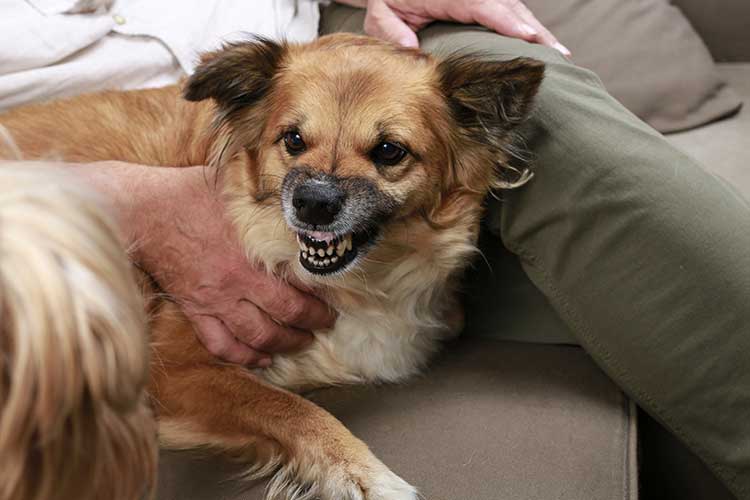Dangers of Protective Dog Behavior
This is a difficult question to answer because human feelings are being used to describe a dog’s reaction. Many pet owners feel their dogs are protecting them from threats. It’s a comforting feeling for humans, but dogs feel frustrated. When dogs growl at people approaching, while sitting in their pet owner’s lap, this is called resource guarding. Yes, your growling dog is protecting his resource, which is you, but protective dog behavior is dangerous that will get worse, if not addressed quickly.
Why Dogs Resource Guard Owners
Guarding valuable resources is a natural dog behavior, but it can cause issues within human homes. Dogs will guard beds, food bowls, high value toys, treats, space and people. Every dog has a different personality, but most will resource guard whatever they find valuable to a degree. Humans are certainly valuable because they put food in dog bowls, provide treats and toys, keep them safe, and can open doors.
Some dogs can bond so deeply with a specific person that they will start to resource guard her from other dogs, people and even children. Sometimes, resource guarding goes undetected until another person or dog enters the home, and then the chaos ensues. Resource guarding should certainly be addressed as soon as possible, as it can result in biting behavior. Plus, no one wants to live with a bully.
Don't Just Take Our Word For It
How to Change Protective Dog Behavior
While many pet owners feel flattered when their dog resource guards them, it’s important to know this behavior will only escalate, if not addressed immediately. When a dog is protecting a person, he’s reacting to a dog or person approaching the pet owner and himself. Protective dog behavior manifests differently for different dogs. Dogs will either freeze, glare at the approaching person, snarl, show teeth, snap or even bite. It’s important to change a dog’s perspective of people approaching while he’s next to his pet owner.
Make It Rain Cheese
Find treats your protective dog absolutely loves, and then chop them into pea-sized treats. Cheese, hot dogs, baked chicken or diced lunchmeat are excellent examples of high value dog treats.
Have a seat on the sofa (or wherever your dog usually resource guards you), and ask your dog to join you. Then, ask a friend to slowly walk into the room and stop at the entrance. As your friend approaches, ask her to toss a steady stream of treats toward your dog’s mouth. After a few seconds, ask your friend to leave the room. Pairing good things with scary situations will change your dog’s perspective, and soon he’ll learn that an approaching person makes cheese rain from the sky.
Oops, He Barked
If your dog barks at the approaching person, ignore him until he stops. Once your dog stops barking, say “yes” and reward with treats while your friend walks out of the room. Next time, practice with your friend standing a bit farther than last time, and continue having her toss treats to your dog. Dog training sessions should last 2-3 minutes maximum.
When to Get Help
Resource guarding can be tricky to address, so it’s always important to partner with a professional dog trainer who only uses positive reinforcement. If a dog lunges, bites, muzzle punches (hits person with muzzle) and/or snaps at someone, then it’s time to bring in a professional. Timing of treats and distance are critical components of resource guarding, and a professional dog trainer can address issues quickly and effectively.





